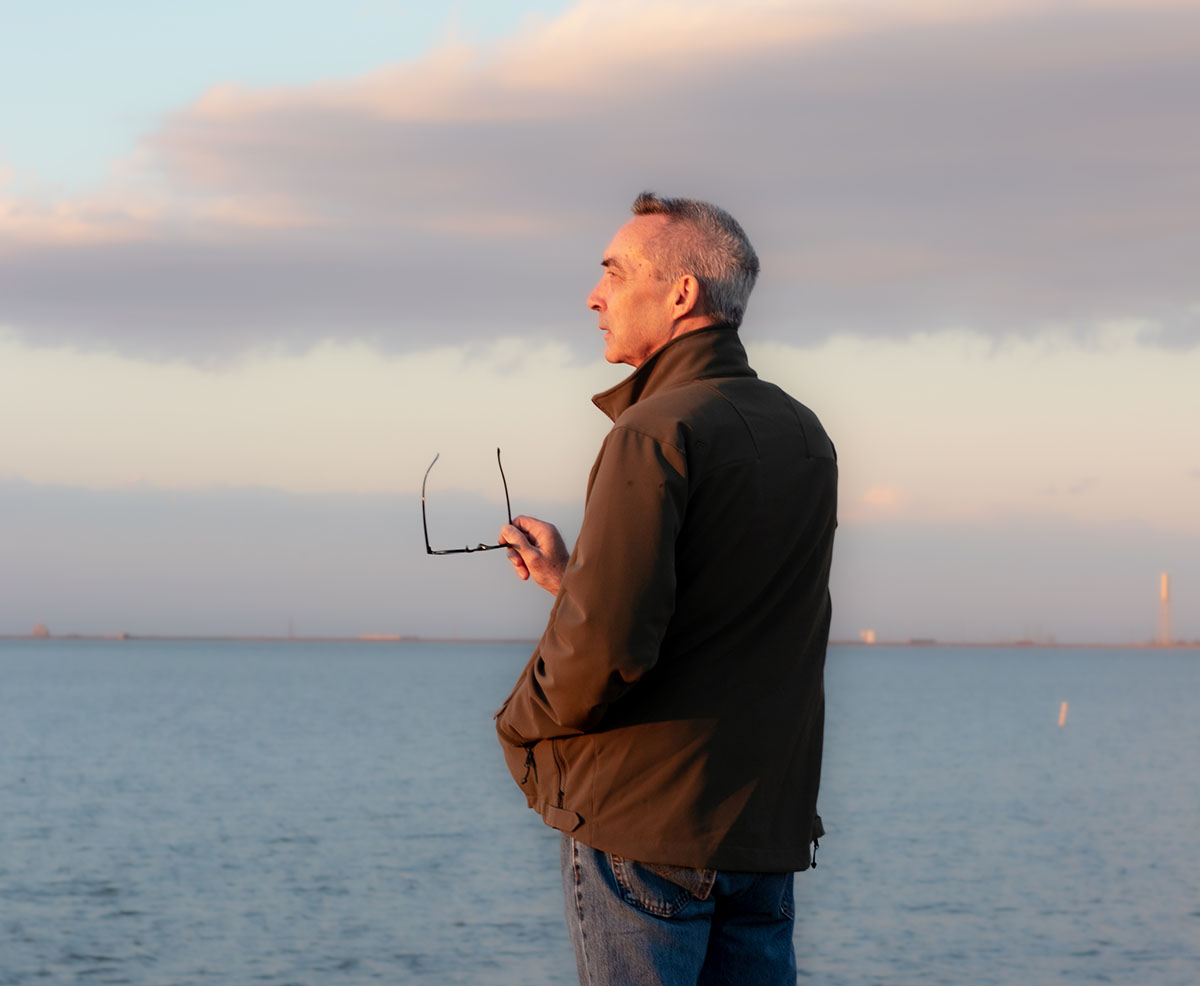Charles, 65, is aware of the advantages he’s had in life. His path wasn’t always smooth. For decades, he struggled with alcoholism. At different points, he had long periods of sobriety. Then life took a turn, he fell on hard times and relapsed. The night he was booked into the Tulsa County jail and held on $1,000 bond was rock bottom. At the time of his arrest, Charles was driving from his home in Arkansas to Oklahoma so he could check himself into a treatment program. He never made it. Along the way, he was stopped by police who charged him with a misdemeanor for carrying his licensed firearm while intoxicated. He was arrested, $1,000 bail was set against him, and he was incarcerated.
“I knew I was wrong. I had to accept it,” Charles said, referring to his arrest. “I’m not a bad person.”
Prior to this, Charles didn’t think much about the US cash bail system. He was aware of the ongoing public debates surrounding bail reform. In recent years, “tough on crime” lawmakers and conservative news outlets across the country have pushed back against limits to the cash bail system, arguing, falsely, that bail reform leads to a rise in crime. Beyond what he heard in passing on the news or read in the papers, Charles knew little.
Once in jail, Charles witnessed a side of the justice system that was left out of most conversations about bail reform: difficulty contacting loved ones from jail, court hearings that were over in a flash with little context or explanation, and abhorrent jail conditions that disproportionately impacted poor people and communities of color. Charles’s experience over the seven days he was incarcerated shook him to his core and forced him to reconsider his position on bail reform.
I’m a conservative,” Charles said. “And my first thought when it came to bail was that it was a politicized issue. There is more to it than most people think.”
Tulsa County uses a fixed money bail schedule. That means most individuals who are arrested are given a money bail amount that corresponds to the charges they are accused of. No consideration is given to a person’s ability to afford the bail amount. If they are able to pay, they are released. If not, they are jailed and have to wait to see a judge.
Charles’s bail was set at $1,000 for the nonviolent misdemeanor offense he was accused of. Although he had enough cash in his wallet to pay that much, he couldn’t because his wallet, along with his other personal possessions, had been confiscated when he arrived at the jail for intake. His cell phone, which had the numbers for all of his personal contacts, was taken too. Any phone calls Charles made would have to be to phone numbers he had memorized.
Inside the jail’s processing area, Charles looked around. There were plastic chairs scattered randomly about and several phone booths that people used to call friends, family members, and lawyers to hear a friendly voice or secure some money they could use to get bailed out. Charles found his way into a phone booth and stared down at the small print instructions that explained how to reach an external line. “I didn’t have my glasses,” Charles said. “I couldn’t read the phone instructions. No one would help me.”
Charles sat in the processing area as minutes passed, squinting at the instructions and searching his memory for a phone number he could remember as the minutes passed. Then a corrections officer came and told him his time was up. Without a single call to anyone, Charles was taken to a cell. About 24 hours later, Charles was taken from his cell in handcuffs and led into a small courtroom for his bond hearing, which was being held virtually, where a judge would determine whether his bond amount could be reduced. Inside the room were four other people awaiting their turn and a single public defender. Through a 40-inch television monitor, the judge refused to reduce Charles’s bond.
“I didn’t understand what was going on,” Charles recalled. “I don’t think I said a word.” After the hearing, correctional officers returned him to his cell. “I had never been to jail before,” Charles said. “It was horrifying.”
From then on, Charles’s life revolved around one thing only: Figuring out how to use the public phone so he could get some help. Whenever he was allowed outside of the cell, Charles ran to the phone to dial different combinations of numbers from his foggy memory, hoping that one would eventually be answered. It didn’t work. He wished someone who worked there would give him some support.
Charles was born and raised in a small rural town in northeast Oklahoma. He played baseball until sunset with friends, strummed blues chords on his guitar, and spent long summer days outdoors, surrounded by a vast landscape, comforted by the quiet of a slow-paced lifestyle. Later, he joined the National Guard and excelled; in 11 years with the Army, he rose to the rank of captain. He married his high school sweetheart and they had a son. He was financially stable enough to buy a house on a lake for his family and save money for his son’s future. In many ways, Charles was living the American dream.

“I was the guy that all I had to do was say yes, and I would get the promotion or the job. If I wanted something, I went and bought it. I lived the kind of life people strive for,” he said.
Even with so much going for him, Charles’s drinking habits slowly began to take over his life. By the time he recognized that he was experiencing a debilitating addiction, he had started to lose the things that mattered most to him. His wife divorced him after 20 years of marriage. He was deeply in debt, behind on mortgage payments and facing foreclosure. Then, that fateful night, he was arrested and wound up in the Tulsa County Jail..
“Alcoholism is a mental obsession and physical craving,” Charles said “I couldn’t escape my illness. It consumed me. Everything in my life was disappearing.”
Though Charles didn’t know it at the time, the public defender assigned to him referred his case to The Bail Project. Our Tulsa team set up a meeting with him right away. A day after our intake interview, we paid his bail and he was released. Case durations in Tulsa are lengthy and people who can’t pay bail remain in jail the entire time. Had The Bail Project not learned of Charles’s situation and intervened, he could have stayed behind bars for several months, simply because he wasn’t able to pay his $1,000 bail for the nonviolent misdemeanor offense that he was accused of committing – an offense that was also his first.
Charles’ experience permanently changed his views on the cash bail system. When he thinks about some of the people he met in jail, including homeless people and others with mental illnesses, he’s outraged that more is not being done to help them. He sees himself in countless others who were less fortunate – people who aren’t dangerous and could have been released if only they had money. He hopes that by sharing his story, people will learn how the cash bail system harms vulnerable people and exacerbates racial and economic inequities. Charles wants people to know that taking money out of the system isn’t dangerous; it’s the right thing to do.
“This is a frustrating and [complex] issue,”Charles said. “I never had legal issues in my life. But once you’re in the system, it sucks you in like mud. They want your money, and if you don’t have it, you get jail time.”
One of the first things Charles did after his release was call the director at a sober living facility where he had previously sought treatment.
“He took me back with open arms. I was so glad he did,” Charles said. “What’s keeping me sober today is helping other people. And I am trying to be self-forgiving so that I can continue my journey where I left off.”
Thank you for reading. The Bail Project is a 501(c)(3) nonprofit organization that is only able to provide direct services and sustain systems change work through donations from people like you. If you found value in this article, please consider supporting our work today.











